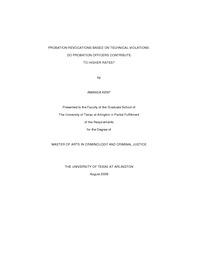
ATTENTION: The works hosted here are being migrated to a new repository that will consolidate resources, improve discoverability, and better show UTA's research impact on the global community. We will update authors as the migration progresses. Please see MavMatrix for more information.
Show simple item record
| dc.contributor.author | Kent, Amanda | en_US |
| dc.date.accessioned | 2009-09-16T18:19:06Z | |
| dc.date.available | 2009-09-16T18:19:06Z | |
| dc.date.issued | 2009-09-16T18:19:06Z | |
| dc.date.submitted | January 2009 | en_US |
| dc.identifier.other | DISS-10317 | en_US |
| dc.identifier.uri | http://hdl.handle.net/10106/1741 | |
| dc.description.abstract | A recent report by The Pew Center on the States (2009) indicated 1 in 31 adults are under the control of the correctional system nationwide. In Texas, it is reported that 1 in 22 adults are under the control of the correctional system or rather in prison, jail, on probation or parole (The Pew Center on the States, 2009). The prisons in Texas and throughout the nation are becoming overcrowded which presents a problem for administrators and the public alike. Texas has experienced an increase of 310% in their prison population between 1985 and 2005 and it is expected to grow another 9% by 2012 (The Pew Center on the States, 2007). With the influx of inmates in prison, alternatives, such as probation, offer another route. Probation, as a means of punishment for crimes, can assist in keeping the prison population down by keeping those individuals in the community but imposing rules, or conditions, to their freedom. Approximately 4.2 million offenders were on probation at yearend 2006, an increase of 30% since 1995 (Glaze & Bonczar, 2007). An increase of offenders on probation also means an increase in probation officer caseloads. Probation officers are not only responsible for keeping the public safe but also provide assistance to the various problems that offenders face. This daily contact, constant monitoring and the various other tasks that must be performed by a probation officer could contribute to burnout, among other things. A burned out probation officer can experience a range of behaviors from a lack of motivation to complete paperwork to an "I don't care" mentality. An officer that doesn't care about their offenders could be more inclined to revoke an offender for a minor infraction of their conditions of probation. They may see the offender as one less burden on their caseload. While the actions of a burned out probation officer faced with the option of revoking an offender are speculative, it could be reasonable to assume that this could occur. The purpose of this thesis is to examine the relationship, if any, of burnout and the decision to revoke an offender based on technical violations. | en_US |
| dc.description.sponsorship | Dobbs, Rhonda | en_US |
| dc.language.iso | EN | en_US |
| dc.publisher | Criminology & Criminal Justice | en_US |
| dc.title | Probation Revocations Based On Technical Violations: Do Probation Officers Contribute To Higher Rates? | en_US |
| dc.type | M.A. | en_US |
| dc.contributor.committeeChair | Dobbs, Rhonda | en_US |
| dc.degree.department | Criminology & Criminal Justice | en_US |
| dc.degree.discipline | Criminology & Criminal Justice | en_US |
| dc.degree.grantor | University of Texas at Arlington | en_US |
| dc.degree.level | masters | en_US |
| dc.degree.name | M.A. | en_US |
| dc.identifier.externalLink | http://www.uta.edu/ra/real/editprofile.php?onlyview=1&pid=1333 | |
| dc.identifier.externalLinkDescription | Link to Research Profiles | |
Files in this item
- Name:
- Kent_uta_2502M_10317.pdf
- Size:
- 527.2Kb
- Format:
- PDF
This item appears in the following Collection(s)
Show simple item record


